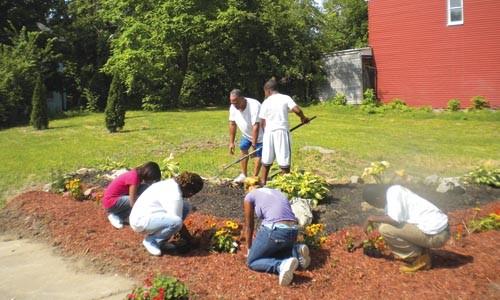
Since her eldest son, Charlie, was gunned down nine years ago, Sharon Daniels of Beltzhoover has dedicated her life to end the hatred that ended his. She now runs My Brothers Keeper, a nonprofit transitional home and a youth program dedicated to her son's memory.
"It is a sense of utter worthlessness that has plagued this community," she says.
Charlie was a college student and a bricklayer, but he also "had a bout with marijuana," his mother notes. On an afternoon in 2001, Charlie and his younger brother Terrell were sitting in a subcompact car in McKinley Park. According to published reports at the time, Charlie was shot by an acquaintance with whom he'd had a previous altercation. When the man approached the car, Charlie ran away.
However, seeing Terrell still in the car, he ran back to shield him. Charlie, 23, was shot 14 times.
Terrell carried his body back home. The tragic events inspired Sharon Daniels to start My Brothers Keeper, a re-unification and re-entry transitional program.
"There's no greater love than someone who lays down their own life for you," she says. "I don't want anyone else to endure the senseless pain I felt when I looked at my son and he didn't blink."
She has approached her mission two ways: aiding those with drug and alcohol addictions or attracted to street life through her transitional house, and intervening early through a newer youth-development program that targets teens ages 14 through 18.
One of the program's most public outreach efforts is its annual basketball game and cookout. The free My Brothers Keeper Seventh Annual "Stop the Violence" Cookout and Memorial Basketball Game will be held at noon on Sat., July 31, at the Lower McKinley Park in Beltzhoover -- the same neighborhood park where her son was killed. Those who have lost loved ones to violence are encouraged to attend to honor them at the game.
Daniels partially uses MBK to intervene with teens who have been in trouble before or at a vulnerable age. In the youth program's second year, she works mostly with teens in the southern Pittsburgh neighborhoods of Beltzhoover, St. Clair, Knoxville and Arlington, as well as Mount Oliver, areas she says that have traditionally had bad blood for no apparent reason.
But if there are neighborhood divisions among the 20 teens she's working with on July 23, it's hard to tell. On this particular day, the teens are separated mostly by gender rather than neighborhoods. Though they have the refuge of a church's air-conditioned basement, they have spent the week working in the sun around the neighborhood, clearing brush, mowing grass, painting houses. The teens are trained by professionals in various trades, then hired to do jobs in the community at a nominal cost to residents and businesses, and receive a stipend.
"We're trying to teach them to be a part of the solution," Daniels says. "Manage or be managed."
While they work hard, they also reap the benefits of things like kayak trips or lessons from a hip-hop artist. It's making an impact on participants like Martell Martin and Jared McCray. Martin, a high school senior, is eyeing college. McCray is an English major at California University.
"We can walk past a house that looks good and I can say, 'I did that,'" say Martin. "I'm part of something bigger."
On this particular Friday, the students are learning from Deaconess Laura Eleam, the program's spiritual director, followed by two Pittsburgh Public Schools teachers and special guest Jackie Wilson, CEO of the Three Rivers Adoption Council.
Youth counselor Quincy Jones ensures the teens are listening. At 32, he has his own hard lessons to teach. He admits he was a "street guy" once, until he got a five-year prison term for conspiracy to sell cocaine. "I always wanted to come home and be a good example because I was such a bad example," he says. "Now I don't have to run. I don't have to watch my back."
When he got out eight months ago, Jones had trouble getting steady work. He reached out to Daniels, who helped lay out a plan to get his life on track. He's now a counselor with MBK's youth program.
Daniels and her crew take a tough-love approach. Teens and grown men alike note she's not afraid to "step on their necks" when they aren't pulling their weight. At the transitional house in Beltzhoover, she requires residents to attend weekly church services, community service, school or work, and three to five AA or NA meetings a week.
"Drugs or alcohol are only 10 percent of the problem," says Daniels, herself a recovered addict. "The other 90 percent we need to address is why you make the same mistakes."
MBK also runs a construction and catering business and offers on-site employment and skills training to its residents, since, Daniel says, "a lot of people don't want to hire folks with criminal histories."
The MBK transitional program, at minimum, is six months, but she allows people to stay as long as they need to -- some for 18 months -- to help them re-enter society successfully. She accepts nonviolent offenders released from prison and those recently released from rehab. And Daniels believes her methods are working. In 2009, she says, MBK saw a 68 percent success rate of participants not returning to jail.
"When you come to My Brothers Keeper, you will not leave with your hat in your hand," Daniels says. "You will have tasted what life can offer."














